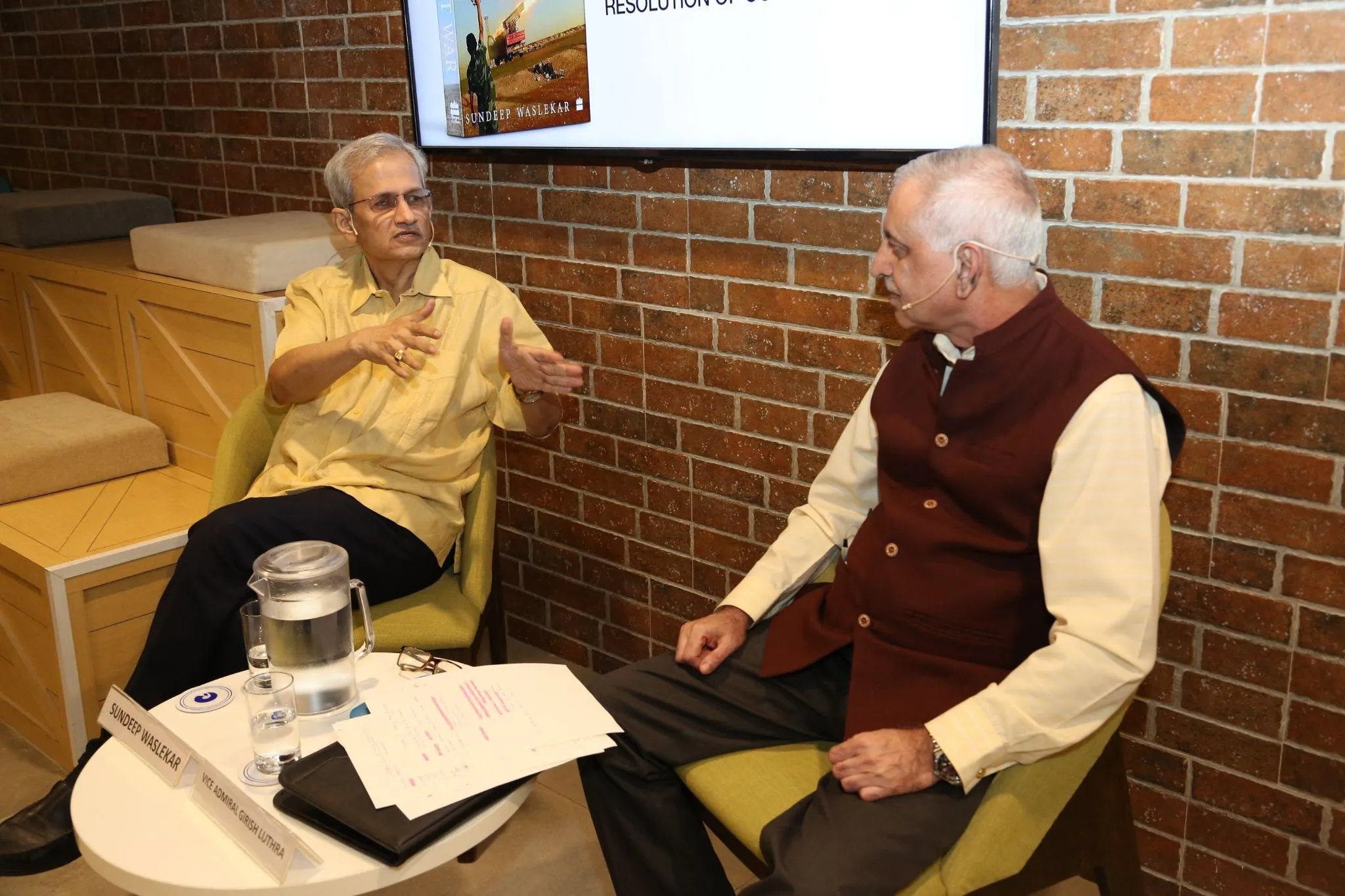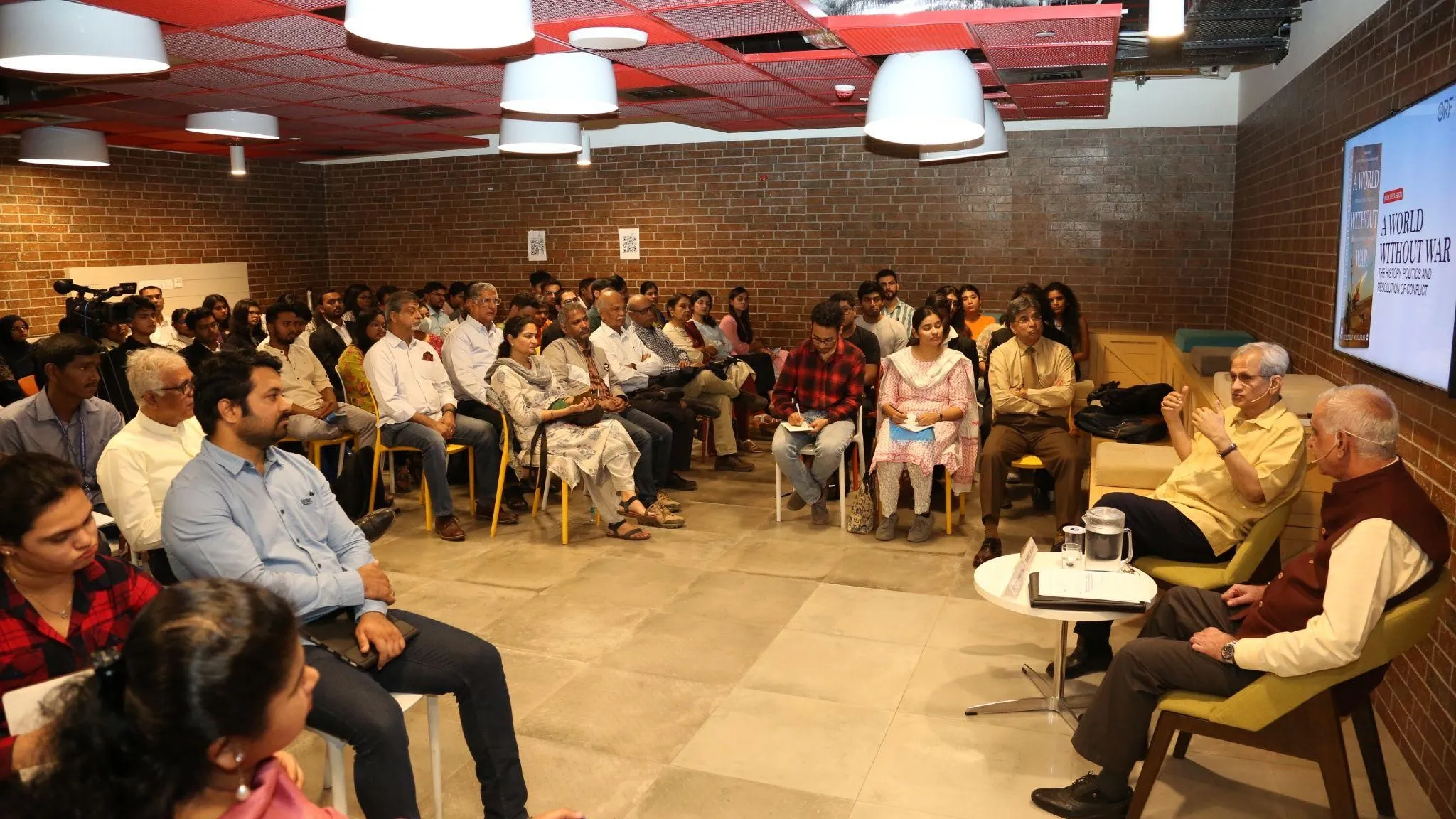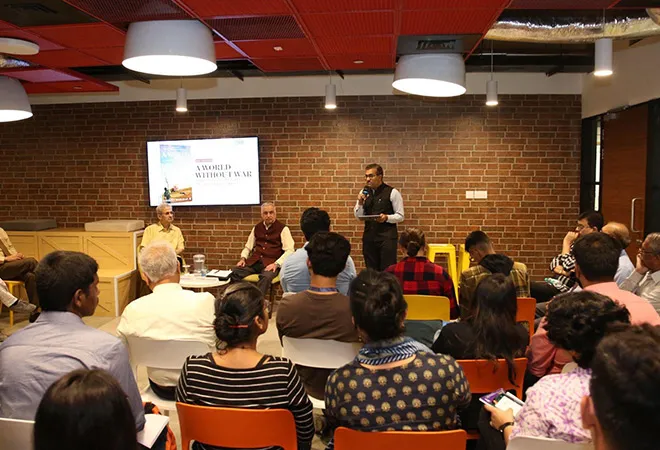Sundeep Waslekar’s book,
A World Without War, studies the history and politics of war and offers a solution for achieving world peace and global progress by exiting the arms race. The book evaluates the origins of war and weaponry, enumerates the dangers of nuclear weapons, and draws the link between nationalism and war. Discussing his book with Vice Admiral Girish Luthra, Distinguished Fellow, ORF, Waslekar explained the genesis, relevance, and purpose of his book in a world fraught with flashpoints that could ignite a widespread armed conflict. Over 80 people, including college students, attended the book discussion organised by ORF on 17 January 2023 in Mumbai, drawing much interest from those pursuing international relations and policy studies.
Discussing the futility of war, Waslekar stated that we may enter a war either intentionally or unintentionally, however, it takes only a few minutes to witness the destruction caused by it. He added that technological advancements in cyber, biotechnology, and nuclear energy, among others, have benefitted humankind but are also being misused for violence and mass disruption. As a result, he warned that humanity is only one miscalculation away from global wreckage.
Waslekar emphasised that major militaries in the world have increased their defence spending purely for their nationalist sentiments. However, he added that the countries manufacturing and possessing weapons are never attacked, while the other states that do not manufacture weapons are regularly attacked creating an imbalance that, he stated, is at the heart of today’s proxy and civil wars.

Responding to the generally held belief that nuclear deterrence had prevented another nuclear tragedy after Hiroshima and Nagasaki, Waslekar maintained that nuclear deterrence theory “is a lie”. It is only by chance that the world has skipped nuclear catastrophe and “humanity remains in danger of a nuclear tragedy” because the “armament race is still alive and thriving”. He emphasised that the military-industrial complexes (MICs) influence government policy and spending significantly. Defence companies are lobbying for continued or increased military spending, even in the absence of any immediate military threats. While economic growth and employment considerations may drive MICs, their implications for world peace are severe.
Waslekar highlighted that the rising differences among the countries and the inability of the United Nations (UN) to address the emerging international security challenges only exacerbate this situation. Therefore, it is time to reform the UN system, that reflects a world order that is now history. He continued that the UN is no longer forward-looking and certainly cannot provide any relief from emerging challenges, as shown by its ineffectiveness against the COVID-19 pandemic. In his opinion, this international body may have proved its efficacy in the domain of Sustainable Development Goals, finance, and economy, but has lagged in ensuring peace and security despite that being its first objective as per the UN charter.
Waslekar argued that war is not a result of economic competition but rather a choice, and one must adhere to the choice to create peace. The good news is that there is awareness, and scholars have proposed solutions toward the path of peace. He further added that humanity has always shown resilience to war, and hence, there is a need for a civilisational response where people participate in global governance under a global social contract. “Ordinary people can bring real change in the world,” he said, citing his first example on this subject from the Nuclear Freeze Campaign, a mass movement started by a civilian, Randall Forsberg, in the United States (US) during the 1980s. Randall’s campaign eventually paved the way for an agreement between the US and the erstwhile Soviet Union to halt nuclear weapons testing, production, and deployment. Likewise, Jody Wiliams’ efforts were instrumental in banning and clearing anti-personnel mines. She was awarded the Nobel Peace Prize for the same in 1997.

During the question-and-answer session, Waslekar shared his thoughts on how war can be prevented. Nations will agree to give up weapons only if such an agreement is decided multilaterally and with mutual consent among all involved, he pointed out, stating that political leaders can drive a path to peace with their decision-making power. He gave an instance of Western Africa being badly affected by terrorism and poverty, but the countries of the region unanimously decided to surrender their sovereignty to the single river flowing in the area. This consensus involves no dam construction or irrigation projects without mutual consent amongst the surrounding countries.
In his closing remarks, Vice Admiral Girish Luthra mentioned that the elimination of war is impossible as it is a part of human experience and existence but it can be overcome by the other half that desires stability for global peace.
This event report has been compiled by Nutika Kale, Research Intern, ORF and Dhaval Desai, Vice President, ORF.
The views expressed above belong to the author(s). ORF research and analyses now available on Telegram! Click here to access our curated content — blogs, longforms and interviews.

 Responding to the generally held belief that nuclear deterrence had prevented another nuclear tragedy after Hiroshima and Nagasaki, Waslekar maintained that nuclear deterrence theory “is a lie”. It is only by chance that the world has skipped nuclear catastrophe and “humanity remains in danger of a nuclear tragedy” because the “armament race is still alive and thriving”. He emphasised that the military-industrial complexes (MICs) influence government policy and spending significantly. Defence companies are lobbying for continued or increased military spending, even in the absence of any immediate military threats. While economic growth and employment considerations may drive MICs, their implications for world peace are severe.
Waslekar highlighted that the rising differences among the countries and the inability of the United Nations (UN) to address the emerging international security challenges only exacerbate this situation. Therefore, it is time to reform the UN system, that reflects a world order that is now history. He continued that the UN is no longer forward-looking and certainly cannot provide any relief from emerging challenges, as shown by its ineffectiveness against the COVID-19 pandemic. In his opinion, this international body may have proved its efficacy in the domain of Sustainable Development Goals, finance, and economy, but has lagged in ensuring peace and security despite that being its first objective as per the UN charter.
Waslekar argued that war is not a result of economic competition but rather a choice, and one must adhere to the choice to create peace. The good news is that there is awareness, and scholars have proposed solutions toward the path of peace. He further added that humanity has always shown resilience to war, and hence, there is a need for a civilisational response where people participate in global governance under a global social contract. “Ordinary people can bring real change in the world,” he said, citing his first example on this subject from the Nuclear Freeze Campaign, a mass movement started by a civilian, Randall Forsberg, in the United States (US) during the 1980s. Randall’s campaign eventually paved the way for an agreement between the US and the erstwhile Soviet Union to halt nuclear weapons testing, production, and deployment. Likewise, Jody Wiliams’ efforts were instrumental in banning and clearing anti-personnel mines. She was awarded the Nobel Peace Prize for the same in 1997.
Responding to the generally held belief that nuclear deterrence had prevented another nuclear tragedy after Hiroshima and Nagasaki, Waslekar maintained that nuclear deterrence theory “is a lie”. It is only by chance that the world has skipped nuclear catastrophe and “humanity remains in danger of a nuclear tragedy” because the “armament race is still alive and thriving”. He emphasised that the military-industrial complexes (MICs) influence government policy and spending significantly. Defence companies are lobbying for continued or increased military spending, even in the absence of any immediate military threats. While economic growth and employment considerations may drive MICs, their implications for world peace are severe.
Waslekar highlighted that the rising differences among the countries and the inability of the United Nations (UN) to address the emerging international security challenges only exacerbate this situation. Therefore, it is time to reform the UN system, that reflects a world order that is now history. He continued that the UN is no longer forward-looking and certainly cannot provide any relief from emerging challenges, as shown by its ineffectiveness against the COVID-19 pandemic. In his opinion, this international body may have proved its efficacy in the domain of Sustainable Development Goals, finance, and economy, but has lagged in ensuring peace and security despite that being its first objective as per the UN charter.
Waslekar argued that war is not a result of economic competition but rather a choice, and one must adhere to the choice to create peace. The good news is that there is awareness, and scholars have proposed solutions toward the path of peace. He further added that humanity has always shown resilience to war, and hence, there is a need for a civilisational response where people participate in global governance under a global social contract. “Ordinary people can bring real change in the world,” he said, citing his first example on this subject from the Nuclear Freeze Campaign, a mass movement started by a civilian, Randall Forsberg, in the United States (US) during the 1980s. Randall’s campaign eventually paved the way for an agreement between the US and the erstwhile Soviet Union to halt nuclear weapons testing, production, and deployment. Likewise, Jody Wiliams’ efforts were instrumental in banning and clearing anti-personnel mines. She was awarded the Nobel Peace Prize for the same in 1997.
 During the question-and-answer session, Waslekar shared his thoughts on how war can be prevented. Nations will agree to give up weapons only if such an agreement is decided multilaterally and with mutual consent among all involved, he pointed out, stating that political leaders can drive a path to peace with their decision-making power. He gave an instance of Western Africa being badly affected by terrorism and poverty, but the countries of the region unanimously decided to surrender their sovereignty to the single river flowing in the area. This consensus involves no dam construction or irrigation projects without mutual consent amongst the surrounding countries.
In his closing remarks, Vice Admiral Girish Luthra mentioned that the elimination of war is impossible as it is a part of human experience and existence but it can be overcome by the other half that desires stability for global peace.
During the question-and-answer session, Waslekar shared his thoughts on how war can be prevented. Nations will agree to give up weapons only if such an agreement is decided multilaterally and with mutual consent among all involved, he pointed out, stating that political leaders can drive a path to peace with their decision-making power. He gave an instance of Western Africa being badly affected by terrorism and poverty, but the countries of the region unanimously decided to surrender their sovereignty to the single river flowing in the area. This consensus involves no dam construction or irrigation projects without mutual consent amongst the surrounding countries.
In his closing remarks, Vice Admiral Girish Luthra mentioned that the elimination of war is impossible as it is a part of human experience and existence but it can be overcome by the other half that desires stability for global peace.